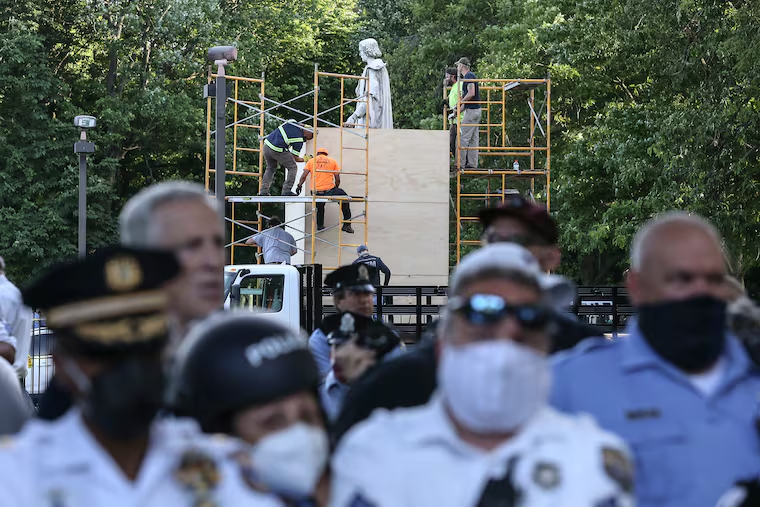Philadelphia Historical Commission votes in favor of moving Christopher Columbus statue from Marconi Plaza
The vote in favor of moving the statue green-lights the Art Commission to cast the deciding vote, which is expected on Aug. 12.

The Philadelphia Historical Commission on Friday advanced plans to remove the statue of Christopher Columbus in Marconi Plaza, an action that, if taken, would be an acknowledgement of the statue’s legacy of racism and a condemnation of the mobs of armed white men who have recently assaulted protesters in front of the monument.
The vote in favor of moving the statue green-lights the Art Commission to cast the deciding vote, which is expected Aug. 12.
If the Art Commission votes for removal, it will make the Columbus statue the second to be moved in Philadelphia since protests against police brutality and racism erupted after the Minneapolis police killing of George Floyd. Protesters have forced cities across the country to dismantle statues of Columbus, as well as Confederate figures, in a movement to reexamine which historical figures are honored and why.
The commissioners voted by 10-2 in favor of removing the 144-year-old statue, ultimately concluding that if the statue remained in Marconi Plaza, it would continue to be a flash point for protests, making it vulnerable to significant damage and a threat to public safety.
Their approval came with the following conditions: that the statue be moved to an undisclosed, secure location in Philadelphia; that a conservator and firm experienced in relocating important works of art be involved in moving it; that an annual report on the sculpture’s condition be sent to the commission; and that there is a visual recording of the sculpture and its condition prior to its moving.
Commissioner Kim Washington said that if a piece of public art starts inciting violence, it’s time to remove it.
“I hate to say that as a member of the commission, because of course we respect history, we respect public art, but above all I respect life,” she said. “We’re talking about people showing up with ... guns and baseball bats and hammers.”
» READ MORE: Keeping Columbus statue at Marconi Plaza would be ‘completely unsafe,’ Philly says in removal proposal
Commissioner John Mattioni, who voted against the move, said it was necessary to keep the statue in the plaza as a recognition of America’s history, however painful, calling Columbus “a product of his times.”
During the Historical Commission’s meeting Friday over Zoom, commissioners were tasked with evaluating a request from the Mayor’s Office to remove the statue, which received its historic designation in 2017, and store it at a secure location. Though the Art Commission has final say, a court order required the final decision take into account a vote from the Historical Commission.
The meeting lasted more than five hours and included public comments from residents, activists, academics, lawyers, and community group leaders about Columbus’ history, and the meaning of the statue in the community. It followed an equally long meeting on Wednesday, when the city presented its proposal to the Art Commission.
Mary Foster, who identified herself as Italian American, Native American, and an educator, told the commissioners Columbus is not taught as a celebrated figure in schools today.
“He is no longer a hero,” Foster said. “It’s something that is historically incorrect, and it’s something that is not any longer our truth.”
» READ MORE: The Christopher Columbus statue: Why it’s an issue right now
While City Public Art Director Margot Berg presented preliminary findings from an online survey that found 80% of people said the Columbus statue represented “false history, genocide, racism, oppression,” the majority of those calling into Friday’s meeting fiercely argued against this.
They questioned the validity of the survey and categorized the call to remove the statue as “mob rule,” an “unfounded” misrepresentation of Columbus’ legacy, and a reflection of anti-Italian sentiment.
Jody Della Barba, a community activist with the 1492 Society and former secretary to Mayor Frank L. Rizzo, said people want the Columbus statue removed because of “anti-Italian stigma.”
Rich Cedrone, president of the Friends of Marconi Plaza, said he believed the debate over removing the statue was being rushed because of the coronavirus pandemic and would prefer a “legal process” with in-person meetings. In the meantime, he said, he would not be opposed to simply covering the statue until that could happen.
“We do not want to have to stand in front of a statue and worry about people tearing it down,” Cedrone said. “That’s not what our lives are about.”
There have been multiple violent incidents at Marconi Plaza, where mobs of white men have gathered around the statue wielding baseball bats and hammers claiming to protect it.
» READ MORE: Protest observers say police allowed South Philly Columbus ‘defenders’ to assault them
» READ MORE: Brawl ensues near South Philadelphia Columbus statue after march, protest at Municipal Services Building
The city argued that in addition to being a threat to public safety, the statue should be relocated “in recognition of the fact that Columbus’ legacy includes the enslavement, forceable removal, and the devastation of the Indigenous people that he encountered, and that in this current moment in our country’s history, the statue can no longer be displayed on public property.”
Mabel Negrete, of Indigenous descent from Chile and executive director of Indigenous Peoples Day Philly Inc., said removing the statue is an effort to understand a shared history.
“People don’t know the history of Indigenous communities. It is something that has been pervasive, it is systematic, institutional racism,” she said. “The removal of this statue, it will only enhance our ability to comprehend the extent of how much damage has been done to our communities across the entire continent.”